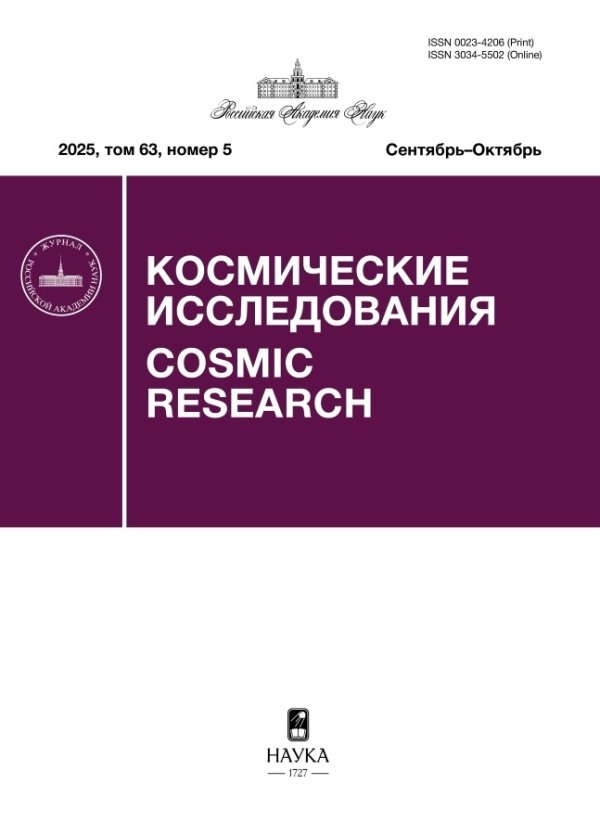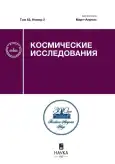Numerical simulation of a 3U-CubeSat orbit maintenance using electrothermal engine and magnetic attitude control system
- Authors: Roldugin D.S.1, Ivanov D.S.1, Tkachev S.S.1, Mashtakov Y.V.1, Khokhlov A.V.2, Starikov K.I.2,3
-
Affiliations:
- Keldysh Institute of Applied Mathematics
- Geoscan Ltd.
- Saint-Petersburg State University
- Issue: Vol 63, No 2 (2025)
- Pages: 169-178
- Section: Articles
- URL: https://rjsvd.com/0023-4206/article/view/683443
- DOI: https://doi.org/10.31857/S0023420625020043
- EDN: https://elibrary.ru/GOGXTV
- ID: 683443
Cite item
Abstract
The study focuses on performing orbit maintenance for a 3U-CubeSat using an electrothermal engine and a simple active magnetic attitude control system. The satellite is equipped with magnetorquers and a magnetometer. As such, it cannot maintain the engine axis attitude along the tangential direction for orbit maintenance. Instead, by realizing a constant dipole moment and damping, attitude along the geomagnetic induction vector is constructed. This attitude is close to tangential on a sun-synchronous orbit near the equator. Numerical simulation of the satellite motion is performed showing capability to provide simple and reliable orbit maintenance. Thrust parameters in uncontrolled motion are analyzed.
Full Text
About the authors
D. S. Roldugin
Keldysh Institute of Applied Mathematics
Author for correspondence.
Email: rolduginds@gmail.com
Russian Federation, Moscow
D. S. Ivanov
Keldysh Institute of Applied Mathematics
Email: rolduginds@gmail.com
Russian Federation, Moscow
S. S. Tkachev
Keldysh Institute of Applied Mathematics
Email: rolduginds@gmail.com
Russian Federation, Moscow
Ya. V. Mashtakov
Keldysh Institute of Applied Mathematics
Email: rolduginds@gmail.com
Russian Federation, Moscow
A. V. Khokhlov
Geoscan Ltd.
Email: rolduginds@gmail.com
Russian Federation, Saint Petersburg
K. I. Starikov
Geoscan Ltd.; Saint-Petersburg State University
Email: rolduginds@gmail.com
Russian Federation, Saint Petersburg; Saint Petersburg
References
- Ovchinnikov M.Y., Roldugin D.S. A survey on active magnetic attitude control algorithms for small satellites // Progress in Aerospace Sciences. 2019. V. 109. Art. ID. 100546. https://doi.org/10.1016/j.paerosci.2019.05.006
- Searcy J.D., Pernicka H.J. Magnetometer-Only Attitude Determination Using Novel Two-Step Kalman Filter Approach // J. Guidance, Control, and Dynamics. 2012. V. 35. Iss. 6. P. 1693–1701.https://doi.org/10.2514/1.57344
- Psiaki M.L. Global Magnetometer-Based Spacecraft Attitude and Rate Estimation // J. Guidance, Control, and Dynamics. 2004. V. 27. Iss. 2. P. 240–250.
- Abdelrahman M., Park S.-Y. Integrated attitude determination and control system via magnetic measurements and actuation // Acta Astronautica. 2011. V. 69. Iss. 3–4. P. 168–185. https://doi.org/10.1016/J.actaastro.2011.03.010
- Буланов Д.М., Сазонов В.В. Исследование эволюции вращательного движения спутника Фотон М-2 // Косм. исслед. 2020. Т. 58. № 4. С. 291–304. https://doi.org/10.31857/S0023420620040032
- Абрашкин В.И., Воронов К.Е., Дорофеев А.С. и др. Определение вращательного движения малого космического аппарата Аист-2Д по данным магнитных измерений // Косм. исслед. 2019. Т. 57. № 1. С. 61–73. https://doi.org/10.1134/S0023420619010011
- Крамлих А.В., Николаев П.Н., Рылько Д.В. Бортовой двухэтапный алгоритм определения ориентации наноспутника SAMSAT-ION // Гироскопия и навигация. 2023. Т. 31. № 2. С. 65–85.
- Ovchinnikov M.Y., Roldugin D.S., Penkov V.I. Asymptotic study of a complete magnetic attitude control cycle providing a single-axis orientation // Acta Astronautica. 2012. V. 77. P. 48–60. https://doi.org/10.1016/j.actaastro.2012.03.001
- Lovera M., Astolfi A. Spacecraft attitude control using magnetic actuators // Automatica. 2004. V. 40. Iss. 8. P. 1405–1414. https://doi.org/10.1016/j.automatica.2004.02.022
- Celani F. Robust three-axis attitude stabilization for inertial pointing spacecraft using magnetorquers // Acta Astronautica. 2015. V. 107. P. 87–96. https://doi.org/10.1016/j.actaastro.2014.11.027
- Wisniewski R. Linear Time-Varying Approach to Satellite Attitude Control Using Only Electromagnetic Actuation // J. Guidance, Control, and Dynamics. 2000. V. 23. Iss. 4. P. 640–647. https://doi.org/10.2514/2.4609
- Okhitina A., Roldugin D., Tkachev S. Application of the PSO for the construction of a 3-axis stable magnetically actuated satellite angular motion // Acta Astronautica. 2022. V. 195. P. 86–97. https://doi.org/10.1016/J.ACTAASTRO.2022.03.001
- Сарычев В.А., Сазонов В.В. Оптимальные параметры пассивных систем ориентации спутников // Косм. исслед. 1976. Т. 14. № 2. С. 198–208.
- Сарычев В.А., Овчинников М.Ю. Движение спутника с постоянным магнитом относительно центра масс // Косм. исслед. 1986. Т. 24. № 4. С. 527–543.
- Белецкий В.В., Яншин А.М. Влияние аэродинамических сил на вращательное движение искусственных спутников. Киев: Наукова Думка, 1984. 187 с.
- Guerman A.D., Ivanov D.S., Roldugin D.S. et al. Orbital and Angular Dynamics Analysis of the Small Satellite SAR Mission INFANTE // Cosmic Research. 2020. V. 58. Iss. 3. P. 206–217. https://doi.org/10.1134/S0010952520030016
- ГОСТ Р 25645.166–2004. Атмосфера Земли верхняя. Модель плотности для баллистического обеспечения полетов искусственных спутников Земли. М.: ИПК Издательство стандартов, 2004. 24 с.
- Alken P., Thébault E., Beggan C.D. et al. International Geomagnetic Reference Field: the thirteenth generation // Earth, Planets and Space. 2021. V. 73. Iss. 1. Art. ID. 49. https://doi.org/10.1186/s40623–020–01288-x
- Иванов Д.С., Овчинников М.Ю., Ролдугин Д.С. и др. Программный комплекс для моделирования орбитального и углового движения спутников // Математическое моделирование. 2019. Т. 31. № 12. С. 44–56. https://doi.org/10.1134/S0234087919120049
Supplementary files




















